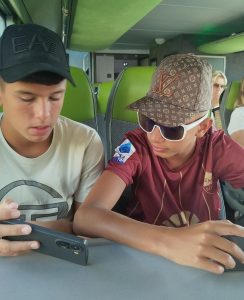About the Project
Digital Tools with Heart
The project “HEARTS: Digital & AI Tools for Youth Mental Health” was created out of a simple but urgent question: how can we better support young people in a world where mental health challenges are growing, and technology shapes every part of their lives?
Across Europe, youth workers face increasing demands to respond to stress, anxiety, and burnout among young people, yet they often lack the tools and knowledge to use digital and AI solutions effectively. At the same time, many young people already turn to their phones, apps, or online spaces in search of help. This project builds a bridge between those realities.
Our main aim is to train youth workers to use digital and AI-based tools for mental health support, making them more confident, competent, and prepared to respond to the needs of young people aged 16–25, especially those with fewer opportunities.
The program is inspired by two key frameworks:
DigComp Conceptual Reference Model, which defines digital competences that every citizen should have.
ETS Competence Model for Youth Workers, which outlines the skills, knowledge, and attitudes needed to work effectively with young people.

By combining these models, the project will give youth workers a chance to:
explore digital tools and apps designed for mental health,
learn how AI can be used responsibly to support emotional well-being,
critically assess the impact of social media on young people,
and strengthen cooperation between youth organizations, schools, and mental health professionals.
The training is not just about technology—it is about values and responsibility. Youth workers will discuss issues of privacy, ethics, and consent, learning how to create safe digital spaces for young people. They will also practice practical strategies to integrate digital support into their daily work, ensuring that technology serves as a tool for connection, not isolation.
In the end, the project seeks to create a ripple effect: participants will return to their communities as multipliers, sharing what they learned and making mental health support more visible, accessible, and inclusive.
